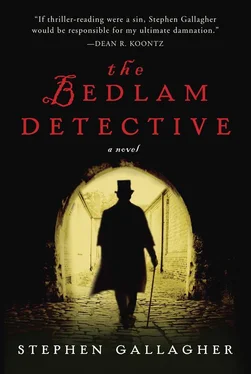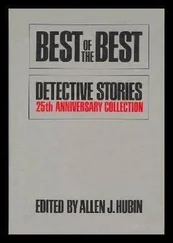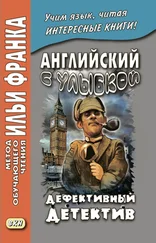Stephen Gallagher - The Bedlam Detective
Здесь есть возможность читать онлайн «Stephen Gallagher - The Bedlam Detective» весь текст электронной книги совершенно бесплатно (целиком полную версию без сокращений). В некоторых случаях можно слушать аудио, скачать через торрент в формате fb2 и присутствует краткое содержание. Жанр: Исторический детектив, на английском языке. Описание произведения, (предисловие) а так же отзывы посетителей доступны на портале библиотеки ЛибКат.
- Название:The Bedlam Detective
- Автор:
- Жанр:
- Год:неизвестен
- ISBN:нет данных
- Рейтинг книги:5 / 5. Голосов: 1
-
Избранное:Добавить в избранное
- Отзывы:
-
Ваша оценка:
- 100
- 1
- 2
- 3
- 4
- 5
The Bedlam Detective: краткое содержание, описание и аннотация
Предлагаем к чтению аннотацию, описание, краткое содержание или предисловие (зависит от того, что написал сам автор книги «The Bedlam Detective»). Если вы не нашли необходимую информацию о книге — напишите в комментариях, мы постараемся отыскать её.
The Bedlam Detective — читать онлайн бесплатно полную книгу (весь текст) целиком
Ниже представлен текст книги, разбитый по страницам. Система сохранения места последней прочитанной страницы, позволяет с удобством читать онлайн бесплатно книгу «The Bedlam Detective», без необходимости каждый раз заново искать на чём Вы остановились. Поставьте закладку, и сможете в любой момент перейти на страницу, на которой закончили чтение.
Интервал:
Закладка:
Was this reasonable? Or did she fool herself? The mirror showed lines, but not so many. Her mind was sharp, and she was still trim. But on the inside, there was a kind of dismay.
She regretted none of the choices she’d made in her life. She might, however, have appreciated some advance warning about the speed with which life’s options would narrow.
Heading up Southwark Bridge Road, she breathed in the air. South London air, a chilled brew of river and coal smoke and horses and fog. Ahead of her, several lines of railway track passed above the road on a mighty iron viaduct that roofed over the world as she entered the space beneath. For the next hundred yards ran a low riveted sky. Here in its shelter stood the all-night pie stand where cabbies stopped to refresh themselves and where Sebastian, when he was around, had an arrangement to pick up his messages.
Once she’d had a goal, which was to find some excuse to bring their troubled son to London. A bad turn in her husband’s career had provided it. Now they were here, and she was finding it hard to settle on any further purpose to her life beyond the day-to-day.
She often wished she could discuss these matters with Sebastian. But whenever she felt able to speak of them, Sebastian was always away on Lunacy business; and when he spent a few days at home, it was as if all the wrong feelings came rising to the fore.
And she knew how he would respond. He would make suggestions. Tell your troubles to a man, and to the best of his ability he’d advise you how to fix them. Complain at that, and you’d bewilder him. Why seek advice, only in order to reject it? What, otherwise, could have been the point of the conversation?
The evening fog put a hazy ring of light around every streetlamp. Five minutes’ walk ahead was the river. Beyond the river, the great shining capital, while behind her spread Southwark’s unhealthy warren of tenements, warehouses, and overcrowded dwellings, along with its churches, workshops, and gilded public houses.
She rarely crossed the river. When she reached Southwark Street, she turned right. These days her journeys were always the same; from home to the Evelina, from the Evelina to her home.
Such as it was. Four rooms and an attic above a wardrobe maker’s, reached by a stairway between two shops. It was her second home in London, and their sixth or seventh in the past nine years. Back when Sebastian had been the rising British Pinkerton man in the Philadelphia office, they’d rented a neat row house in a nice part of town.
Life was different now. And in at least one respect, it surely was better. It was for Robert’s sake that she’d sold her mother’s emeralds to get them here, and there could be no question that he’d gained by the move.
She was passing the chocolate factory, a Victorian building that was straining to be something more French and fancy. Its windows were busy with flutes and fruit and columns and added detail. She was close to home now. Her last turn would be into a side street after the next railway bridge, across from the Borough Market.
Their son, Robert, had recently turned eighteen. He’d been a child of fearsome intelligence and overpowering obsessions; loving, articulate, and blessed with a phenomenal memory. But he was also a child who could be rendered mute and uncooperative by any attempt to impose discipline upon him. Rare was the teacher or physician who’d spare the time or the patience to understand the boy’s needs. Everyone to whom they turned would class him as subnormal, or as feebleminded at best.
Elisabeth had read journals and learned papers, but it was a chance remark by her own clinician that had led her to the work in London of Dr. John Langdon Down. In a series of lectures to the Medical Society the doctor had described many of Robert’s attributes, concluding that the condition was the product of something other than the congenital or the merely accidental. Here, at last, she’d thought, was someone who might understand.
Down had founded an institute for his patients, a family-run community on the outskirts of London, based on principles of education and compassion. Elisabeth had written to him there, only to learn that the doctor had passed on. His sons were continuing his work. Reginald Langdon Down had advised caution over her hopes for Robert. He might be helped, but it was wrong to hope for anything so conclusive as a cure.
After an hour spent with Robert, mainly discussing the dime magazines of which the boy had an encyclopedic knowledge, Dr. Reginald had recommended a private day college run by a colleague in South Hampstead. They’d managed to secure him a place. Robert had begun to flourish there and, for the first time in his life, to be happy outside the home.
It had been a struggle for the family. They had no income and were four in number, including Elisabeth’s unmarried sister, Frances. But then, with letters of introduction secured from the Down brothers, her husband had found employment with Sir James Crichton-Browne, the Lord Chancellor’s Visitor in Lunacy.
Crichton-Browne’s investigator was on the point of retiring, and the Visitor had need of a man with Sebastian’s talents. The work suited his skills, but the pay was not good. Elisabeth had taken her job at the hospital, and Frances, when not accompanying Robert across town, took in piecework for a local haberdasher.
Here was their street. Some would call it an alley. She looked up at the windows above the wardrobe maker’s and saw that the sitting-room lamps were lit. Their previous lodgings had been wired for electricity, but they hadn’t been able to afford to use it.
This was not the life that she’d dreamed of, but this was the life that she had. Her son seemed happy, and only in her worst moments did she find herself resenting him for it. Sebastian would be home in a day or two.
It was far from perfection. But what would she change? Here was one aspect of her existence that she never could have predicted: that so many of the things that she valued would have been born out of her disappointments. Which made it impossible for her to wish her disappointments away.
And now she was home.
She let herself into the tiny hallway between the piano shop and the wardrobe maker’s, and ascended the stairway to her waiting family.
NINE
It was Sebastian’s habit, when away from London,to send a postcard home at the first opportunity. His wife would be assured of his safe arrival, and if it was a picture card then Robert could add it to his collection.
His Arnmouth card that evening was a plain one from a sixpenny packet in his luggage, and when writing it he made no mention of the afternoon’s events. He addressed it in his room and then took it downstairs to give to the landlord for the morning collection.
He walked into a fug of beer and smoke. In the hour since his return from the assembly hall, the bar had been opened. The saloon and public rooms were now filled with local men, some the whistle-wetters from that afternoon, others still in their volunteer armbands. Despite the shadow that had been cast by the day, there was nothing subdued about their conversation. Tragedy always sharpened a community.
“Will you take a drink, Mister Becker?” the landlord asked him over the roar. The landlord’s name was Bill Turnbull, and he’d shed his constable’s jacket to work the pumps.
“I was hoping to get some supper,” Sebastian said. “Is there any possibility?”
“I’ll send Dolly out when she’s got a minute,” Bill Turnbull said, “if you don’t mind a wait.”
Supposing it would make no difference if he did mind, Sebastian agreed that he didn’t. He ordered a brandy and then, turning from the bar, spied Ralph Endell. The blacksmith was behind a table with three or four others, in a nook between the fireplace and the dining room. Endell made a gesture of invitation, and Sebastian went over.
Читать дальшеИнтервал:
Закладка:
Похожие книги на «The Bedlam Detective»
Представляем Вашему вниманию похожие книги на «The Bedlam Detective» списком для выбора. Мы отобрали схожую по названию и смыслу литературу в надежде предоставить читателям больше вариантов отыскать новые, интересные, ещё непрочитанные произведения.
Обсуждение, отзывы о книге «The Bedlam Detective» и просто собственные мнения читателей. Оставьте ваши комментарии, напишите, что Вы думаете о произведении, его смысле или главных героях. Укажите что конкретно понравилось, а что нет, и почему Вы так считаете.












